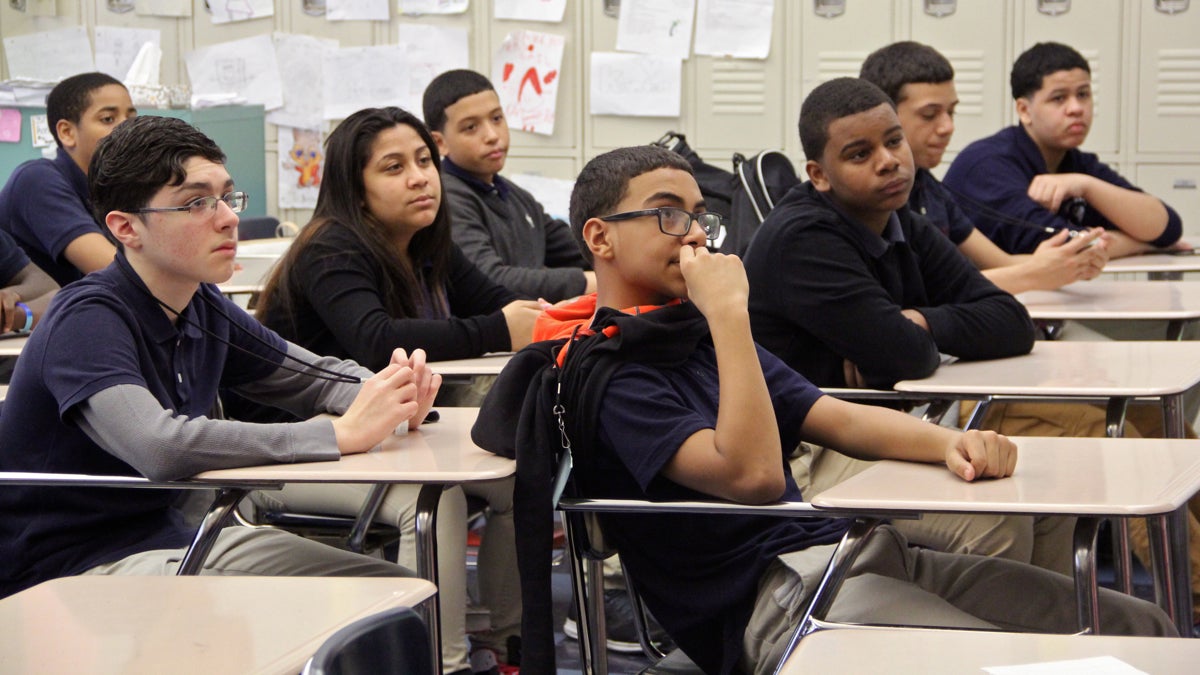Public debate muddies the waters in climate change education
Listen
When trying to teach students about climate change
The public debate over climate change has worked its way into science classrooms, where scientists say it has no place.
The vast majority of climate scientists say that climate change is happening and it’s largely due to human activity.
But only about 40 percent of the American public believes that to be true.
This divide in public sentiment is trickling down into science classrooms, injecting controversy into a topic that scientists don’t believe to be controversial.
‘Teaching the controversy’
Most middle and high school science teachers questioned in a recent national survey said they dedicated some class time to teaching global warming.
But in the same survey, conducted by the National Center for Science Education, or NCSE, more than a third of those educators said they introduce controversy into their lesson plans. Many reported sending explicitly contradictory messages about whether climate change is primarily a natural occurrence or man-made, making the scientific consensus seem weaker than it really is, said the NCSE’s programs and policy director Josh Rosenau.
The non-profit NCSE formed in the 1980s to advocate for science-based evolution education. Around 2012, it expanded its focus as climate change education starting sparking similar controversy.
“We started seeing bills that would mention evolution and climate change next to each other as controversial topics that teachers should be sure to present all sides of,” Rosenau said.
Rosenau said people started asking if there was a group that was like theirs that advocated for climate change education.
“And we looked around and realized there really wasn’t,” Rosenau said. “And clearly there was a need.”
Legislators step into the classroom
One bill that raised the ire of groups like the NCSE was introduced in Tennessee in 2011 by State Representative Bill Dunn.
Dunn said that he wanted to protect teachers who introduced facts that could be seen as challenging the existence of climate change.
“There’s no reason for a teacher to get in trouble if they’re up there and point out that the climate change predicted that there’d be all kinds of hurricanes and it just didn’t happen,” Dunn said. “Why did this happen? Is it because scientists were wrong on this, or is there something else that they didn’t take into consideration? Somebody shouldn’t be punished for bringing something like that up.”
Critics of laws like Dunn’s see them not as protective, but as encouragement for educators to inject controversy into a subject that is not seen as controversial among scientists.
Dunn’s bill passed, as did a similar one that cast climate change as debatable in Louisiana. While these types of bills garner attention, it is difficult to tell if they are having a real impact in the classroom. The Tennessee law has not been challenged in court, and the few science educators in the state that The Pulse interviewed said they are still teaching man-made climate change as fact.
But experts say the political controversy is indeed working its way into lesson plans in some cases.
Temple University education professor Doug Lombardi researches climate change education from the perspective of both teachers and students.
In teacher trainings, he has seen that the misinformation swirling around about climate change trickles down into the classroom.
“We’ve had a couple of the teachers in our project that, originally when they started with us, they would teach the controversy,” Lombardi said.
“They would not inject the scientific perspective, and frankly they were confused about what the scientific perspective was.”
Sticking to the data
Cory Eklund, a middle school science teacher at Germantown Academy, a PreK-12 private school in Fort Washington, Pa., said climate change is integrated into the curriculum there.
During a recent lesson for his seventh graders, there was no pushback when Eklund explained how sky-rocketing carbon dioxide levels are causing warming temperatures and weirder weather, but Eklund said in his ten years of teaching that hasn’t always been the case.
Eklund’s strategy when students question the existence of climate change is to show them the data.
“Don’t just believe me because I am standing in front of you and saying this and I’m your teacher,” Eklund said he tells students.
“Believe me based on what I’m giving you as resources, and let’s learn about how can we find good sources, what does it mean to be a good source versus a bad source,” Eklund said. “I want them to try and make those discoveries on their own.”
New science standards could shape the future
There are reasons to believe climate change education may stick closer to the science in years to come: chief among those reasons are new national science standards introduced in 2013.
“The advent of Next Generation Science Standards has certainly raised the bar for climate change education,” Rosenau said.
The standards have met with some controvery in states like West Virginia and Wyoming, but been adopted by more than a dozen states and Washington, D.C. They require students to understand that human activities are a major factor leading to global warming.
Rosenau argues that for today’s students, that knowledge will be essential.
“Climate change is an issue that a student in school today will be dealing with for the rest of their lives,” Rosenau said.
“They’re going to have to make all sorts of important decisions about politics, about where they live, about how they build their houses…. this is going to be probably the single most critical issue that they’re going to have to think about.”
WHYY is your source for fact-based, in-depth journalism and information. As a nonprofit organization, we rely on financial support from readers like you. Please give today.



